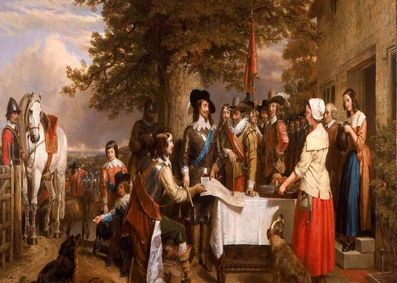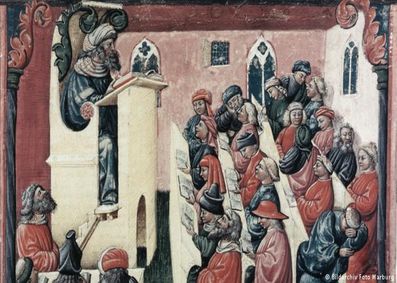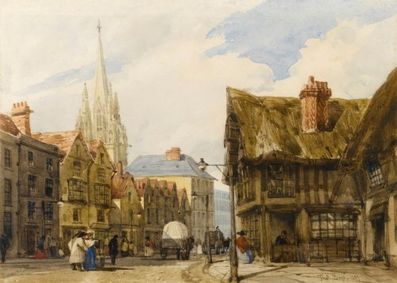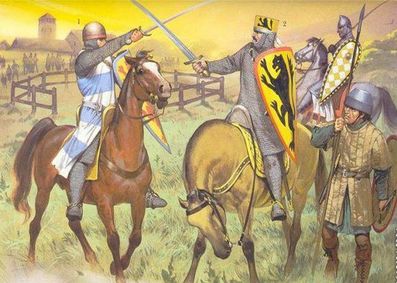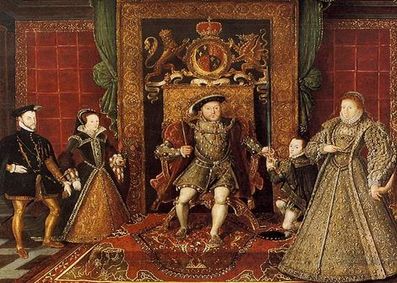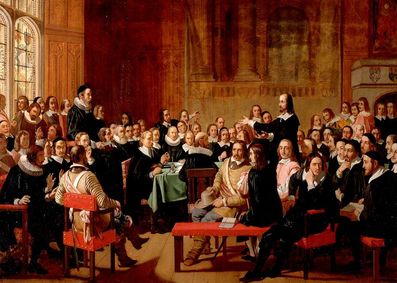- NOW did France insult, having recovered peace at home which hee did owe in a manner to the Queene of England. For they had the more gladly concluded the same amongst themselves, that they might stop the breach against the inundation of the English, being not unmindefull what great slaughters they had made in old time, being called into France by the Duke of Burgundy upon a private grudge. When by this meanes the heate of warre betwixt the French and the English was rather smothered then any firme peace knit, the Queene, having beene neglected by the ungratefull Protestants of France, resolved to take no longer care of other mens estates with perill of her owne, but deliberately betooke her selfe to cogitation of peace; which she assailed by the negotiation of Sir Thomas Smith a wise man and excellently well learned; and the French harkened thereunto. Throckmorton, who then lived in France as it were in free custody, was joyned with him in procuring a peace. France commited the matter to the Moruillier Bishop of Orleans and Jacques Burdin Secretary; who in the moneth of Aprill consented to these conditions of peace at Troys in Champaign: Neither party shall invade other. The one shall not aide any that invadeth the other. Private mens facts shall binde themselves onely. Commerce shall be free. Traitors and Rebels shall not be received. Reservation of rights and Titles also, actions, demands, and claimes which they have or pretend to have one against the other respectively, shall remaine to them safe and whole; and in like manner defences and exceptions shall be reserved. The next day they agreed upon these Articles following, by themselves apart: A certaine summe of money shall be repayed to Queene Elizabeth at times prefixed. Upon the payment of sixe hundred and twenty thousands Crownes, the hostages shall be delivered out of England; and Throckmorton shall returne free into his Country after confirmation of the League. The French testified their joy for this peace by making of Bonfires openly, according to custome. The Queene of England confirmed it by oath, in presence of Gonor and Foix, and within a while after the French King did the like in presence of the Lord Hunsdon; who the same time solemnly invested him into the Order of Saint George, with the Garter, a Robe of honour, a chaine of collar wrought with Roses, with the Image of Saint George hanging at it, etc.
- In these dayes came Ambassadour into England in the roome of the Bishop of Aquila, who was deceased certaine moneths before, Don Diego, or Didaco Gusman de Sylva, Chanon of Toledo, a man venerable for his gravity and Priestly habit. During this interim the English were more hardly dealt withall in Spaine, by the procurement of Don Roderico Gomez de Sylva, in hatred of their Religion. But the Duke of Alva tempered the matter, whether in love towards the English as he pretended, or hatred against Gomez, a man cannot well say. The English also were hardly intreated in the Netherland Provinces of the Spaniard, while Cardinall Granvill in hatred also of their Religion went about to set the English and the Netherlanders (being both Nations happy by mutuall commerce) at variance one against the other. For through his procurement the Netherlanders complained the last yeere by Assenville that greater customes then ordinary were layed upon their marchandizes in England (which notwithstanding was done in the Raigne of Philip and Mary), and also that many of the Netherlanders mechanicall workes were by Act of Parliament prohibited to be brought into England. The English in like manner complained that their goods were confiscated in the Netherlands for very light causes by authority of a certaine new Edict whereby marchandies were forbidden to be exported, that passage through the Netherland Provinces with horses, Salt-peter, gun-powder out of Italy and Germany, was prohibited, that most grievous imposts, and such as were never before heard of, were most rigorously exacted for victuals, anchorages, houses, etc., and all this contrary to the League of commerce heretofore concluded, called The great Intercourse.
- Meane while the Dutchesse of Parma, Governesse of the Lowe Countreies, forbideth first the matter of stuffe of the marchandies prohibited in England to be carried into England out of the Low Countries; and soone after forbiddeth the English cloathes to be brought into the Netherlands, seeking a colour thereof by reason of the plague which raged very lately in England; indeed through the subtill counsell of the Cardinall of Granvill, to the end that the English Clothiers, and those that in great number depended upon them, might be stirred up to commotion when their cloaths were not exported, and in the meane time clothing might be set up in the Netherlands, to the damage of the English. The English, stomaking this, take occasion as if they stood in feare of the Inquisition of Spaine now brought into the Netherlands, and forseeing future tumult in the Netherlands, settle their Mart or Staple of cloathes and English marchandies at Emden upon the river Ems in Friesland. On the other side the Gouvernesse of the Netherlands forbiddeth by Edict all Netherlanders to trade with the English at Emden or elsewhere, or to bring any marchandies bought of them into the Netherlands, upon paine of confiscation.
- These courses Gusman thought to bee sharp and damageable to both parts. For he, being a wise man, knew how great wealth redounded to the Netherlands by the English mens trafficke; whence it was that Lodovic Malanus Earle of Flanders, about the yeere 1338, allured the English by graunting them most ample priviledges to settle the Staple of English wooll at Bruges in Flanders. For from that time ever since, through the resort of almost all Nations into Flanders to buy clothes of English wooll and other English marchandies, retailing, shipping, and fishing hath flourished among the Netherlanders. Insomuch as the English wooll hath beene to them the true golden Fleece, whereunto that famous Order of the Knight-hood of the Golden Fleece hath beene beholden for the originall, and the Dukes of Burgundy have beene indebted for their wealth. Certainely in these our dayes (I speake it out of bookes of Accounts), the commerce betwixd the English and the Netherlanders hath amounted to above twelve millions of Dukats every yeere, and the English clothes (to say nothing of Lead, Tinne, etc.) five millions of Dukats. Hence it was that hee laboured to compound the matter, and so wrought that the commerce which had beene stopped was restored to the former state, and whatseover had beene decreed and ordained on both sides from the first of January in the first yeere of Queene Elizabeth, was suspended till more full order were taken by Commissioners on both sides.
- But the next yeere following, when the Lord Vicount Montacute, Nicholas Wotton, and Walter Haddon, Master of the Requests, for the English, Montigni, Assonville, and Joachim Giles for the Netherlanders, began once or twice to treate of these things at Bruges, the tumults in the Netherlands renewing, interrupted the Conference, after that it was agreed that there should bee free commerce till the one Prince should denounce the contrary to the other, the marchants on both sides being warned thereof forty dayes before, that they might provide for themselves and their marchandises.
- These matters being compounded abroad, the Queene went in progresse to take the pleasures of the Country, and visited the University of Cambridge, one of the eyes of Britaine; where being with all kindes of honour received by the Students, and delighted with Comedies, Tragedies, and Scholasticall disputations, she survayed every Colledge, and in a Latin Oration acknowledged their love and kindenesse, commending their multiplicity of learning, exhorting them to bend their whole minde and cogitations to the study of good Letters, whereof she promised to deserve well.
- At her returne she created Robert Dudley, who was Master of the Horse, and flourished in highest grace with her, and whom she had with a privy purpose (as I said) to be husband of the Queene of Scots, Baron of Denbigh (giving him Denbigh with large possessions thereunto belonging) and the next day created him Earle of Leicester, to him and the heires male of his body lawfully begotten; and all to make him the more worthy of so high a marriage. For whose sake also she had before honored his eldest brother Ambrose with the title of Lord Lisle, or of the Isle,, and Earle of Warwick, To him and his lawfull heires male, and to his brother Robert, and the heires male of his body lawfully begotten. Dudley having these honours heaped upon him, to the end to winde himselfe into favour with the Queene of Scots, whom he wooed by all the offices he could, and laboured to winne her favour, forthwith accused the Lord Keeper Bacon to the Queene that he had intermeddled against the Queene of Scots in the matter of succession; and was privy to a booke, wherein Hales (whom I have before spoken of) went about to derive the Title of the Crowne of England, in case the Queene should dye without issue, to the House of Suffolke. Whereupon Hales was committed to the Towre; but Bacon (though Hales denyed it) Cecyl with much adoe and late restored to the Queenes favour, who kept his owne judgement in this point fast locked up within his owne brest, and so alwayes resolved to doe , unless (as he said) the Queene her selfe command him to deliver it. Who certainly never heard any thing more unwillingly then that the Title of succession should be called in disputation. But the wiser and wealthier sort were not more sollicitous of any thing in the world, whilest in this difference about Religion the hot Protestants thought that the Queene of Scots, though her Title were most undoubted, yet because she was of another Religion, was to be rejected upon very high and subtill points of Law; and of the Papists some, and the greatest part of all indifferent men, though she was to be admitted, as being the true and undoubted heire by Lawe; and some of them preferred Margaret the Queene of Scots aunt, and wife to Matthew Stuart Earle of Lenox, and her children, as from whom they had great hopes being borne in England. These things were not hid from the Queene of Scots, who to provent them all she could sent for Matthew Earle of Lenox into Scotland, by the advice of the Countesse of Lenox her aunt, under colour to restore him to his ancient inheritance, but indeed to consult with him about these matters; who by his wives meanes obtained both leave and Letters of commendation from Queene Elizabeth, when he had now beene a banished man out of his Country full twenty yeeres.
- This Matthew (to fetch the matter higher for the more perspicuity) was descended of the same stocke of the Stuarts that the Royall family of the King of Scots were, and borne of their blood Royall. For Mary the daughter of James the second, King of Scots, bare to James Hamilton James, the first of that stocke Earle of Arran, and Mary a daughter, wife to Matthew Stuart Earle of Lenox, the first of this Christen name. James Earle of Arran divorcing his first wife, marryed over her head in her life time Jenetta of Betone, the Cardinall of Betones aunt, on whom he begate James Duke of Chastel-herault, whom his emulators hereupon held for illegitimate. Mary the Earle of Arrans sister bare to Matthew John Earle of Lenox, who being slaine by the Hamiltons while sought to set King James the fourth at liberty, left this second Matthew Stuart Earle of Lenox, of whom I now speake, a man most deare to James the fifth for his fathers sake. But Matthew, after the King was dead, and that the Hamiltons bare all the sway, withdrew himselfe into France; from whence being sent backe into Scotland by Henry the French King, lest the Common-wealth of Scotland should receive any detriment by Hamilton the Regent, he performed stout service. Neverthelesse being indeed a good and open-hearted man, hee was intrapped in the cunning wiles of the Cardinall of Betone and Hamilton, and within a short time lost the French Kings favour. And when he could neither stay at home nor returne into France, he came into England and put himselfe under the protection of King Henry the eighth, who gladly intertained him being a mighty man of adherents in the West parts of Scotland, and though the Hamiltons condemned him and confiscated his possessions, yet he acknowledged him the next heire to the Crowne of Scotland after Mary, being then a young infant, and gave him Margaret Douglasse his niece by his elder sister to wife, with large possessions in England to the value of seventeene hundred markes by the yeere, covenanting with him, that hee should deliver into the King of Englands hands the Castell of Donbritton and the Ile of Buth, with the Castell of Rothsay. Which things being stoutly undertaken, fayled of the successe.
- This Matthew Earle of Lenox, the Queene of Scots being a wise and provident woman, and one which set up her rest in hope of England, sent for (as I said) into Scotland, remitted his banishment, and restored him to his ancient livings, both to oppose him against the attempts of James her base brother, whom shee had honoured with the Earledom of Murray, and also to cut off from others all hope of succession in England by this Matheew sonne Henry Lord Darly. For if he being a young man, of the blood Royall, should match into some potent family of England, she doubted lest he relying upon the strength of the English, might be some let [hinderance] unto her in her Title to the succession in England, forasmuch as in the opinion of most men he was holden to be the next heire after to the Kingdome of England. Neither was there any one thing which she more desired then that the two Kingdomes of Scotland and England might be devolved by her upon some man of the Scottish blood, and might by him be propagated to posterity in the ancient name of the Stuarts.
- Hereof Queene Elizabeth got some inkling, who to prevent it advertised the Queene of Scots by Randolph that the marriage was generally so disliked by all the English that she had proroged the Parliament to another time against the mindes of her Councell, lest Estates of the Realme being incensed, should even for this cause enact somewhat against her Title to the succession. Which that it might not be done afterward, and that shee might give satisfaction to the English, she advised her to thinke of some other marriage; and now againe shee earnestly commended Leicester unto her for an husband, whom in this respect chiefly shee had raised to the honour of an Earle.
- Hereupon the Earle of Bedford and Randolph, the Earle of Murray and Lidington, Commissioners on both sides, treated at Barwick in the moneth of November, about a marriage with Leicester. The English Commissioners promised inviolable amity, perpetuall peace, and assured hope of succession, if she would marry with Leicester. For upon this condition Queene Elizabeth had promised to declare her by Act of Parliament her adoptive daughter or sister, as soone as she was married. The Scottish Commissioners maintained stiffly that it stood not with the dignity of a Queene, which had been sought unto for a wife by Charles the Emperour Ferdinands sonne, by the French King, the Prince of Condey, and the Duke of Ferrara, to condescend to the marriage of a new created Earle and a subject of England, upon hope only, without Dowry; neither stood it with the Queene of Englands honour, to commend such an husband to so great a Princesse, her kinswoman, but this would be a most certaine argument of her love, if she would permit her to choose her a man at her pleasure, which would imbrace peace with England, and withall assigne unto her some annuall pension and confirme unto her the Title of succession by Act of Parliament. In all this businesse, Queene Elizabeth much desired that by this marriage the succession of both Kingdomes might be established in an English stocke, though she made but slow speed about it. The Queene of Scots, when the matter was prolonged the space of full two yeeres, and now she desitined the Lord Darly to be her husband, suspected that she was deceitfully dealt withall, and that Queene Elizabeth propounded this marriage to no other purpose but to chose for her selfe the best of all the suitors, or else marry with Leicester the more excusably, if she being an absolute Queene did first consent to the marriage of Leicester. But the Scottish Commissioners, providing for their owne private respects, had resolved to breake off any match whatsoever by any meanses, and that to maintaine their owne power with the Queene. Queene Elizabeth gave secret warning to Bedford by close Letters that he should not urge the matter. And in this hope hee was thought to have secretly favoured the Lord Darly.
Early Modern England
История Англии Раннего Нового времени
Данный сайт является научно-образовательным информационным проектом и предназначен для всех, кто проявляет интерес к исторической науке. В настоящее время образование в вузах Российской Федерации переживает трудные времена. При переходе со «специалитета» на «бакалавриат» происходит сокращение аудиторных занятий для студентов и общее увеличение годовой учебной нагрузки преподавателей. В таких непростых условиях данный проект призван помочь преподавателям, аспирантам и студентам исторических факультетов в изучении истории Англии раннего Нового времени.
ANNO DOMINI 1564
Популярные статьи
- Экономическое развитие Англии в XVI - середине XVII
- Культура Англии XVI-XVII
- Английские фермеры первой половины XVII (по материалам расходных книг и дневников)
- Экономическая политика Елизаветы Тюдор
- Основные направления финансовой политики Тюдоров (1485-1603)
- Преступления в тюдоровской Англии (по данным современника)
- Древние Королевские прерогативы и парламент в XVI-XVII вв. Столкновение интересов.
- Аграрное законодательство Елизаветы Тюдор и первых Стюартов
- Современники о пауперизме в Англии XVI
- Из истории английских йоменов (происхождение, эволюция, социальный статус)
Последние публикации
- Рецензия на монографию Кирюхина Д.В. Стратегия репрезентации королевской власти в культурной и интеллектуальной жизни английского двора в 1485-1533 гг.
- Роль Альманаха «Журнал только для девушек» в воспитании английских интеллектуалов конца XIX – начала XX века
- Культура питания Викторианской и Эдвардианской Англии в мире кролика Питера Беатрис Поттер
- Придворные художники династии Тюдоров в контексте становления культурно-интеллектуального сообщества
- Сладости «епископской трапезы» в эпистолярном и поэтическом наследии Эразма Роттердамского и Андреа Аммонио
- «Анналы Генриха VII» (1504–1505 гг., 1507–1508 гг.) Бернара Андре: история, пропаганда или мифотворчество?
- Легендарные правители древности в первой английской речной поэме “Κυκνειον άσμα” придворного поэта и антиквара Дж. Лиланда
- Роль цвета в визуализации образов власти в правление первых Тюдоров
- "Жестокое время Тюдоров" на страницах современного исторического романа
- Поиски методов повышения файнов в Англии первой трети XVII в. (на примере манора Лавенэм графства Саффолк)
